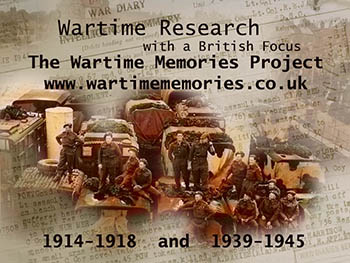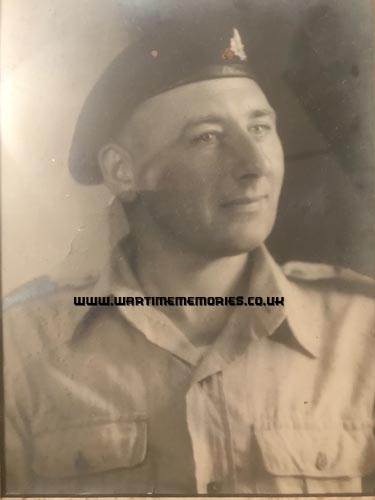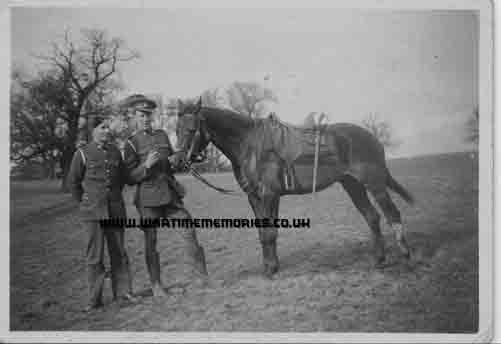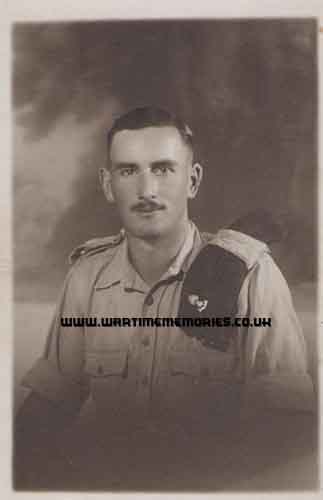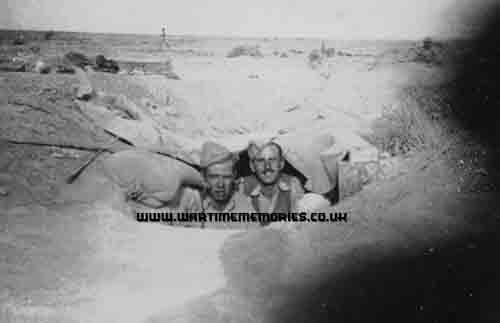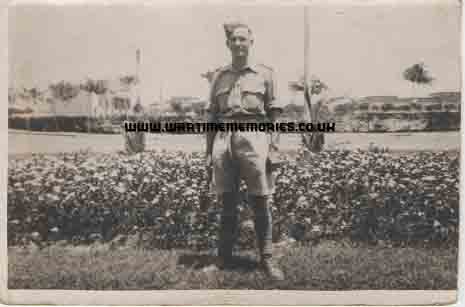Sgt. Victor James Butcher Royal Army Service Corps
Excerpts from a Diary of a Soldier 1940 – 44 ….
….as lamp signaller from the bridge, passing many messages to our convoy of seventeen vessels, excluding the cruiser ‘London’ and six destroyers. Once out to sea we were told our destination was Basra, Iraq. The convoy zigzagging continually, moved through heavy seas to off Greenland, then turned south towards American neutral waters.
After ten days at sea we sighted the Azores, and on the 26th August we put into Freetown, East Africa for refuelling. The temperature was humid and it rained for all the three days we laid there. We were not allowed ashore owing to the many diseases rife in this hellhole of the Empire.
Once again, more and more sea with temperatures of 110 in the shade, and food steadily getting worse, until we sighted one day the 2nd September 1941, a great range of mountains, and later, Cape Town, South Africa looking like a scenario of New York, with a huge flat topped mountain (Table Mountain) behind.
Here we stepped ashore for the first time. It was indeed a very modern city with skyscrapers, wide streets and American sedans and limousines everywhere. Here, Jack and I first had a huge meal, afterwards having several beers on a jovial South African, and later visiting a dance, and walking in the Orange Grove Park by the Governor’s residence. The native quarter was out of bounds to troops.
On the second day ashore Jack and I met Mrs Jackson, a charming South African who took us for a drive to a seaside resort along the coast called Mueyenberg. Here we had an enjoyable day finishing at a dance, where I was in some demand because I knew the new dance steps from England. The girls were very attractive and much better educated than the average English dance hall crowd. The next day Mrs Jackson met us in her Packard 90 and took us for a mountain drive into the Hottentot ranges, through the native village of Paarl, which owes its name to a pearly coloured mountain behind the village. Here fruit is the industry, mostly controlled by the Boer South Africans, descendants of the originals, and mostly anti-British. We had tea in a roadhouse high in the hills and returned to dinner in the evening. Mr Jackson had arthritis, a remainder from the last war. I enjoyed their company and I never felt as if I was accepting charity in going out with them. Later that evening we went to a show. The next day another long drive into the mountains always amazingly beautiful. The climate was just right. Actually they thought it was rather cold, (it was Spring there). We drove to Capetown in the evening and stopped in the dark on the side of Table Mountain to look at the city blazing with lights, and the numerous large liners that had formed part of our convoy, including Britannic, Andes, Stirling Castle, Windsor and Warwick Castle, Valiant and many others. Looking down on the city alive with neon and blue lights was a wonderful experience. We went to a big hotel for supper, and then very reluctantly said goodbye to the Jackson’s and went back on board.
The following morning we up anchored and amid great enthusiasm we sailed out of the harbour attended by tugs and pilot boats, while aircraft roared overhead. I continued my work on the bridge and learned that our next port was Bombay. The weather aboard got more and more humid, and in a temperature of 110 in the shade we docked in at Ballard pier, Bombay.
Here we disembarked and left for good our luxurious home, Strathallen. In full marching order, with rifles and carrying kitbags, we marched across Bombay to another docks, indescribably filthy and amid smells which the traveller always associates with Bombay. The heat was intense! We were kept waiting for hours before we eventually climbed aboard a disreputable looking steamer called ‘Neamalia’ (9000 tons) a troopship. Built in 1908 and manned by a dirty native crew, and a few tough looking whites, our first look at this ancient craft did little to revive our dropping spirits. Our mess deck happened to be the first one down, which gave a little more air - electric fans whirred stale air from above, and the whole looked indescribably filthy, after our hospital-like quarters on the ‘Strath’. We stowed our kit and were allowed ashore in the evening to walk and sweat in the dock area only. We never had a good look at the city, which appeared to be very modern and planned. The Malabar Hill region (a waterfront of luxury hotels) compared favourably with Capetown.
The following day we moved out into midstream (probably to stop troops deserting the hell ship!) and the food was putrid. The bread was sour and maggots were rife in meat, potatoes and everything. Tons of food was thrown overboard and only after four days lying at anchor, the food began to improve. This brings me right up to date.
Today, 25th September 1941 we sailed away from the smells of Bombay for Basra. We are doing no work on this ship and it is impossible for everyone to sit down on the decks, so overcrowded is it. The air system is antiquated and insufficient and the only saving grace is plenty of cold seawater showers. I am doing nothing but reading (there is a small library) and showering. We cannot sleep on deck every night - no room, and can only do so every third night. The other two, we swelter below, where lifting an arm causes a fresh outbreak of perspiration. I never sweated so much in all my life - it just drips from everyone and a shirt is wringing wet in no time. Now there is a bit of sea breeze we are a bit easier, but the temperature is still well over 100 in the shade. There is a good deal of moaning about the appalling conditions - one could stand the heat if we had more room and better food. However the worst is to come, as Basra possesses an even hotter temperature and with arid burning sand. We shall see, as Baldwin remarked.
Incidentally, I learned today that this troopship was sunk in the last war, and was on the bottom for two years, which would account for the pitted eaten appearance of all the ironwork aboard her. The officer’s cabins are much better but Mr Woollet told me their food is also uneatable in the main. What I could do to a good Sunday dinner, at home with bags of gravy, and later apple pudding! But I digress. The food is getting shorter but on the 30th September in the evening we start sailing up the Persian Gulf between rows of coloured lights.
On 1st October 1941 we docked at Ashar just wide of Basra. Great activity getting all the kits off but we are at last ashore and on a lorry bound for what is promised as a rest camp. What a place! Imagine miles of tents, on a flat plain, with no living plant or grass, and everything covered in a white dust. This is what met our gaze. A wind blows the dust through clothing and into our eyes, mouths, everywhere. We get four tents, twelve men in each. After a look around we find that we are the first white regiment to land here. Food is cooked in the open on wood fires and so far consists of stew and rice.
8th October 1941. Our transport has arrived. My W/T Bug has had a bashing. The frame is bent and all the tools have been pinched the locks being broken. We are waiting for our W/T supplies and then moving up country to Baghdad. The guns are here also a light AA Brigade and many Indian troops, Ghurkas, Sikhs etc. Water is now scarce - no washing facilities and we shave in a mess tin. No blackout. We have had a look at Ashar, typical Arab town. Dirty with scores of beggars yelling for ‘baksheesh’ and selling dates etc. The shops are just holes in the walls. In them one can see the most exquisite silverware being made by bearded Arabs. They look like a page out of the Bible. Most of them wear robes and burkhas but a few use western dress. An incongruous note is struck in the bazaars by Arabs in robes driving big American cars, and taxis are everywhere, very cheap. Petrol is easier to get than water. We are accosted by guides and they speak rough English asking us to visit brothels etc. 1000 fils is the admission (25/-) and they are legalised. We went to a café and had a bottle of English beer which cost about 3/- a bottle! There were some dancing girls there - Armenians and Russians, really lovely girls who get a commission on all drinks bought at the tables, also we presume open for other trade. Beyond our reach on our pay! The Arab and veiled women about the town are all as white as I am and resemble Jewesses. Most of them were evacuated however when we took Ashar from the rebel Iraqis.
I am writing this in Baghdad. We came up from Ashar to Habbaniyah in a twenty mile long convoy with R/T control. I was the last vehicle in the convoy and sent news of breakdowns forward by radio. A hazardous journey across open desert with deep sand and hard bumpy places that soon found the weak spots in Army transport. Two men were unfortunately killed and one injured when a lorry loaded with 3.7 ammo overturned (this was easily done) and the men were crushed beneath the ammo. On the way we passed through the ancient city of Ur of the Chaldeans, birthplace of Abraham and Babylon, the ancient city of Biblical times. Nothing left now but ruins which are interesting. And so to Habbaniyah. Imagine coming to a modern village, blazing with electric lights, in a desolate desert! Habb is a camp for RAF drome. Swarming with RAF troops. We are not camped at the drome but in tents on a vast plateau overlooking it and in the position enjoyed by the Iraqi troops while storming the drome early this year. They lost 30,000 men when making the attempt.
We stayed at Habbaniyah for one month, and enjoyed it. Pictures, baths and a social club in the drome all added to our comfort. During this time I made several journeys across the desert to Baghdad on shopping expeditions. Then on the road again to move up to Quiara an oil centre forty five miles from Mosul. Quiara is a centre for a pipeline oil well. It is a village and under the shadow of two great pylons, we are living in what were German engineers’ bungalows. Here we spent a comfortable Christmas and I had to tackle exchange duty when Sewell got shot. I was now receiving mail fairly regularly. Mr Woollett left us in a blaze of glory, and after hearing that my brother was married, I went into hospital with bronchitis - not serious, and out on the 4th February 1942.
11th February 1942 - a fortnight after this we learnt with considerable relief that we were leaving Iraq for somewhere in Syria. The only information led us to believe the place would be the coastal town of Haifa. We started on convoy, the whole regiment split into groups and we worked wireless traffic control. Day in and out we travelled, vast distances with every possible discomfort as the weather was poor.
Before striking Rutbah we lost half the convoy owing to rain turning the desert into a sea of mud. Vehicles stuck up to their bonnets and for twelve hours I drove back and forth in the dark flashing my headlights in an effort to guide the lorries in to the beginning of a road. It was a nightmare journey and its says much for the Major who was with me when I say he never turned a hair when I drove clean off a raised road with a fifteen foot drop. Luckily the old bus landed on all fours and was none the worse!
After we struck the road things improved. We got the scattered remnants together and proceeded until one day we crossed the mountain ranges of the Trans-jordan. How can I describe it! Grass and trees again, and fruit growing in profusion. The mountain road, winding and twisting up and down, with sheer drops over the side and one skid meaning curtains. After we crossed the range came the river Jordan, now a muddy stream set in orange groves.
Later we reached the city of Haifa but did not stop driving on along the coast of the Med until on 29th February we wearily came at last to Beirut or Beyrouth on the shores of the Med, a pretty town backed by snow capped mountains set in a natural bay. We slept under canvas but soon moved to Caserne Joffre, a big white barracks left by the French after their sudden departure from Syria and the Lebanon. Here we revelled in baths, comfort and good food.
On looking around Beirut we decided that it was a welcome change from the desert, with its fine modern buildings, boulevards and cafes. It is very French. All the Arabs or Lebanese are of fair skin and dressed in the western styles. The use French a lot and the atmosphere of the estimets and cafes is very French. We took on a big job in running the communications of this town and our linesmen are busy laying miles of cable. In wireless too we are second line and stand by at gun sites whenever trouble threatens.
We decided to have a look at the brothel area. There are over one hundred licensed brothels, the biggest being Marica’s. Picture a large building with a hall, rather like a theatre, and a neon sign outside. Inside, a staircase and wide marble stairs to the assembly room. Here you choose your lady. Many soldiers, airmen and naval men besides civilians stand in a foyer. Rows of doors stretch down a corridor and presently a young girl comes out smiling. She is a Greek. Young, attractive, she wears a silk dressing gown and sandals. Her face is beautifully made up and her toe nails enamelled. She walks swaying gracefully up to us. “Allo boys, you want me? Very nice, very clean, very hygienic, I make you lof me, yes!†She advances to Jack, “Oh, what a beeg moustacheâ€, she pulls it, “You want me?†Four pounds Syrian (about 10/-). We smile at her sheepishly and she laughs. “Shufte!†(look) and she whips the robe open. Under it she is quite naked. Her body is pink and lovely. Small firm breasts and long thighs. We don’t get another look. “Maybe tomorrow, yesâ€. She smiles and leaves us to walk over to some Aussies. We gape. Other women are doing the same thing. We turn and trail downstairs, our heavy boots clattering on marble. Outside in the fresh air Bill voices our thoughts. “God, she was lovely! I could easily have let her lead me to a bed after all this timeâ€.
Afterwards we get the hang of it and decide it isn’t worth it. Love for money is always a business transaction - and we agree that quite probably the fact that she is only a machine would rob the moment of all feeling, and leave us unable to have her. For often the best part of a sex union is the leading up to it - this of course the prostitute has no time or use for. Also we are most of us engaged - and I for one, though no prude, want to return the same as I went out. Not pure - but no worse. The women in brothels are clean - sometimes.
In the cafes, there is always a bit of variety. One evening we were having a beer when that fool Jack told the waiter I was a swing drummer. He returned with a request that I play a couple of numbers with a five piece band. I couldn’t refuse and chose a couple of rumbas. The drummer watched me closely asking many questions and the floor was packed. Later a soldier took over the piano and ‘we went to town’. I had loads of beer lined up from ‘fans’ and finally we drove home to the barracks in a gharry with a load of beer and the manager’s blessing.
17th May 1942: We are still here, and life is much the same. We keep out of the cafes now - it has become more expensive, so we usually go to the pictures and have an egg sandwich when we come out. This suits me - the summer is here and most evenings we go swimming in ‘Signals Bay’ a sheltered bay between towering cliffs. I have also driven up into the mountains to the snow line. Seventeen miles of climbing turns and no fences! But from the top what a view! Beirut as big as the palm of a man’s hand with the coastline stretching on like looking down from a plan and even clouds below us. Wonderful! I am enjoying being here.
About now I went on leave to Jerusalem. Then I got a septic foot which put me in the New Zealand Hospital for a month. Recovered thankfully none the worse.
25th October 1942. We moved from Beirut to Zahlah near Ba’labakk for manoeuvres.
We heard that the 87th was going into action, and we left Zahlah on 24th November 1942. Followed a long convoy, destination probably Tobruk! However the W/T Section was taken away from the 87th during this convoy, and we pushed on ahead to Mena, Cairo. We stayed seven days and I was made Lance Corporal.
On again, to find the 57th - somewhere in the Western Desert! At Tobruk we saw the 87th again and spent a day with them. The 57th were still way ahead and we drove 1000 miles past Musa, Salum, Halfaya (Hellfire) Pass, Bug.Bug, Darnah up to Benghazi. The road and descent was littered with German tanks, lorries, guns, bearing witness to their hurried retreat. About this time I came under fire for the first time, when six Stukas had a go at the road. They dropped bombs and one bug had a narrow escape, but we got through.
We arrived at Benghazi, a modern Italian colonial town on the night of 14th December 1942 and had a heavy raid on the harbour that night. The 57th were still ahead, so we pushed on again to Ajdabiya where we at long last found the 57th Signals and Regiment. No rest was ours however, for the Regiment was protecting landing grounds in forward areas, and with the retreating Axis just a few miles in front we moved every few days until at last we had a whole fortnight in Castel Benito - the large drome serving Tripoli. The rest was welcomed and we had had no Christmas to speak of. No cigarettes and food and water is very scarce. However on the second days after Tripoli fell, I went in and had a look. It is very modern, wide streets and big buildings and a wonderful harbour which was full of sunken ships. Shops began to open and the Italian civilians began to come out, once they found we did not intend to rape and pillage as the Germans told them we would. Then Mr Churchill visited us and I saw the great procession and heard him speak.
On 20th February 1943 we moved again to Zuwarah, the batteries protecting the landing ground there.
On 28th February 1943 I was promoted Corporal chiefly because of some quick thinking I did. A line truck got lost, and was heading over the border into Tunisia and enemy territory. I chased the truck in a car and caught them just through Ben Guerdane. Back to Libya again in victory!
On 2nd March we pulled out and into Tunisia, the Regiment having one battery in Medenine, one right up in the line, and one at Zarzis. The Regiment had a bashing and heavy raids were taking place. One battery was shelled out of Medenine with casualties and it was most unpleasant. However the push started and we moved with it, arriving on 7th April once again in Medenine with Jerry in full retreat. All the way up we were passing lorries laden with enemy troops captured in the push. One of our batteries was in the thick of things again at Gabes. We had W/T trucks with all batteries and my job now is to look after them all - I don’t do any operating personally which is rather a pity but more restful. In this push we have had AA right forward - a very different arrangement, but landing grounds (our speciality) must be protected.
NB: About this time I got a 3rd tape - now W/T Sgt 1/0.
On up to Sousse, and we hadn’t been there long when we heard that the enemy was finally routed in Tunisia - Tunis and Bizerte had fallen and the enemy was being exterminated as he tried to get away from Cap Bon. So it was over. For six weeks I was at a rest camp established at Monistare, and had a good time swimming, dancing and getting pretty sozzled!
Then we were told we were going to Cairo again - the less said about the journey the better, but our transport was buggered when we reached Egypt, camping at Quassasin. There among other things I met C. Surridge - we had a celebration and went for a week’s leave at Cairo on the SIGs houseboat on the Nile. Great fun with the ATS next door!
Newly equipped, we went back up the Western Desert to Tripoli, and started practising on ‘wet’ landings - this means business - the main 8th Army was fighting in Sicily.
On 6th September 1943 we embarked on LCIs and LSTs - and were told our destination - the mainland of Italy, at Salerno, with ten Corps to stiffen the US 5th Army. We landed at 0900 on 9th September - ‘D’ Day. On shore, there was confused organisation. We were under heavy fire and all traffic was told to get inland. I got separated from the Commanding Officer and with two ops and a Morris we tried to find him, as we comprised an advance party. We went three miles inland, when I was turned back to the beaches by a harassed Colonel. It appeared we were behind the enemy. There was a great deal of gunning and the truck was hit by splinters. We met the CO’s party and then followed a hectic fortnight. Weary from lack of sleep, and moving back and forth day and night as Jerry broken through and we counter attacked. On once occasion the SIGs and RA went into action as infantry, and I fired my first angry shot of the war. We were relieved by Krr’s after forty eight hours being part of a force holding one side of the vital aerodrome. I saw a lot of men killed here and it shook me a bit.
To keep it brief, on the 18th September the 8th and Monty joined us from the South and the siege was over. From here I went on to Pompeii and saw Vesuvius glowing away in the dark. The Jerries were going back fast, and we drove through Naples with cheering crowds lining the streets and throwing fruit and flowers.
After Christmas 1943 at Capua came the battle of the Volturno. The regiment played a big part here and I nearly got it. I stepped out of a jeep holding a W/T set, and an airburst exploded 70ft above. The jeep was hit and I didn’t get a scratch - I was deafened by the bang!
By February 1944 we were at Cessa on the Gangliano, and then our brigade was transferred back to 8th Army and we eventually got to Venafro. We stuck here some time and made friends with a civvy doctor, whose house we were in. Here I finally got transferred to 14LAA and went up route six passing through all the well known places until we reached Cassino. It was in a shocking state, completely flat. At Terni, I was recalled to Brigade - SIGs in AA were disbanded and I left 12AA for ever. I went back to 8th Army SIGs - one hundred and twenty miles back! And then one hundred and thirty miles forward again to 6th Armoured Division. Arriving I was sent to 26 Armoured Brigade at Perugia, and found life very difficult. I was working as an operator to the Brigadier, on a Sherman tank in which he insisted in charging about the battlefront. We hardly ever were out of S.A fire and mortars, and shelling made life grim. There was no sleep to speak of - about two hours in twenty four.
Then I got a break, and came back to Brigade HQ to be I/C ACV operator. This was more settled, but hours were still long - four hours in twenty four when in action.
After Perugia we came on slowly working through Arezzo where we were the first troops in, and were shelled horribly by 105mm, an electrician being hit 50 yards from me. Then came Castiglione, and Montosi, Montevarchi, San Giovanni, Figline Valdarno and Diacetto. At Figline Valdarno we stuck, and were able to get a week’s leave in. I went to Rome, over two hundred miles, and had a good week, described in detail in letters home.
So we butted up against the Gothic Line and stuck again. We took the opportunity to have day leave to Florence now relieved and clear.
3rd September 1944. The attack in Europe goes well - our troops are threatening the border of Germany itself - over on the Adriatic here the 8th have broken through the Gothic Line - opposite us the Country is totally impossible for armour.
22nd September 1944. Now at grips with the Gothic Line. Mountainous Country and we are having a quiet time. Heard today of demobilising scheme and increased pay! Roll on.
Victor James Butcher
Driver and ACV Operator
Royal Army Service Corps


